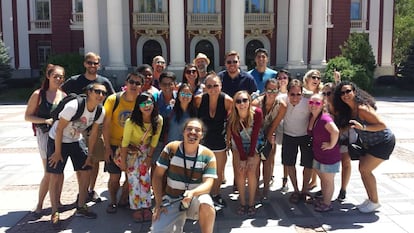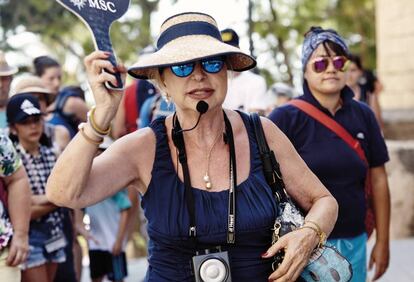Spain’s GuruWalk wants to be the Airbnb of walking tours
Official tour guide groups say the Valencia-based website is degrading the profession

“If people visiting a city no longer say they’ve rented accommodation, but rather that they’ve booked an Airbnb, our goal is for them to say the same about GuruWalk,” says Juan Castillo, co-founder of a Valencia-based online community that connects travelers with local tour guides. “We want the term guruwalk to become synonymous with free tour.”
By free, Castillo means that users are free to choose how much they pay their guide based on the experience. But official tour guides are wary of this new manifestation of the collaborative economy.
They charge through tips, which we view as undignified because any work should be paid for
Almudena Cencerrado, CEFAPIT
“They advertise themselves as free tours but we feel that they are not, because they charge through tips, which we additionally view as undignified because any work should be paid for,” says Almudena Cencerrado, president of the Confederation of Official Tourism Guides of Spain, CEFAPIT.
CEFAPIT’s concerns predate the boom of the sharing economy, since donation-based tours have existed for a long time outside the online world. According to Cencerrado, these “free walking tours” could be considered to be infringing on the profession when they are provided by untrained guides who may not even be declaring their income or paying taxes on it.
The association is asking for greater oversight by the relevant authorities, in this case the regional tourism departments, to ensure that all professionals are working under the same conditions and to avoid “activities that occasionally walk a thin line between the legal and the illegal.”
But the head of GuruWalk has an answer to that: “What these people want is to maintain the status quo because they’ve been privileged individuals working in a large market that was shared out among just a few. But they cannot fight against something that is growing because it’s travelers themselves who demand it, because these experiences are cheaper and more fun.”

Castillo adds that most of the guides who offer these “free tours” have the required permits, although his website does not check because it works merely as an intermediary. “Many official guides are now using GuruWalk as an online marketing channel, because they can run their ads free of charge and reach more people. After that, each one of them takes responsibility for the quality of their service, for observing all applicable regional legislation and for keeping up for their tax obligations.”
What GuruWalk does provide for new inexperienced guides who sign up is a “mega-tutorial” developed by Pablo Pérez-Manglano, another co-founder. This document claims that it is possible to earn anywhere between €300 and €500 daily working five hours a day, and that each tourist typically pays between €8 and €12 for a two-and-a-half-hour tour. According to these figures, guides would need to offer two daily tours to groups of about 20 people each in order to make €500.
Up until now, the global reference for this kind of activity has been Freetour.com, which was launched in 2014 by the Dublin-based group HostelCulture and now serves 350 cities. But GuruWalk, created in Valencia last year, has its sights set on global market domination by the end of this year. And the goal does not seem so far-fetched. In just one year, it has managed to build a presence in 200 cities and boasts 30,000 registered users, including 1,000 guides. And the founders say that tour bookings are growing at a weekly pace of 25%, with upwards of 2,000 in the last week of July.
In order to achieve these figures, GuruWalk has benefited from investment by a group that has also funded other successful projects such as Glovo, Cabify, Housify, Habitissimo, Restaurantes.com, Chiffy, Offerum or Spaceboost. The founders secured €200,000 in an initial financing round through convertible notes, and Castillo says they are planning to put together a further €100,000 before December.
Once the platform is well established, guides could be charged a small amount for each reservation. The model is expected to be introduced in 2019, when the company hopes to have a staff of 15 employees, up from the current six.
English version by Susana Urra.
Tu suscripción se está usando en otro dispositivo
¿Quieres añadir otro usuario a tu suscripción?
Si continúas leyendo en este dispositivo, no se podrá leer en el otro.
FlechaTu suscripción se está usando en otro dispositivo y solo puedes acceder a EL PAÍS desde un dispositivo a la vez.
Si quieres compartir tu cuenta, cambia tu suscripción a la modalidad Premium, así podrás añadir otro usuario. Cada uno accederá con su propia cuenta de email, lo que os permitirá personalizar vuestra experiencia en EL PAÍS.
¿Tienes una suscripción de empresa? Accede aquí para contratar más cuentas.
En el caso de no saber quién está usando tu cuenta, te recomendamos cambiar tu contraseña aquí.
Si decides continuar compartiendo tu cuenta, este mensaje se mostrará en tu dispositivo y en el de la otra persona que está usando tu cuenta de forma indefinida, afectando a tu experiencia de lectura. Puedes consultar aquí los términos y condiciones de la suscripción digital.








































